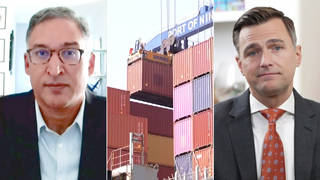
Topics
Guests
- Joseph StiglitzJoseph Stiglitz, Nobel Prize-winning economist, Columbia University professor and chief economist for the Roosevelt Institute. His new book is called Rewriting the Rules of the American Economy: An Agenda for Growth and Shared Prosperity.
The fight over income inequality gained national attention when fast-food workers walked off the job in hundreds of cities across the country on Tuesday demanding a $15-an-hour minimum wage and union rights. Some “Fight for $15” protesters rallied outside the Republican presidential debate in Milwaukee. During the debate, billionaire Donald Trump and other Republican contenders rejected calls to increase the minimum wage. We speak to Nobel Prize-winning economist Joseph Stiglitz, author of the new book, “Rewriting the Rules of the American Economy: An Agenda for Growth and Shared Prosperity.” “We’re saying something is wrong with the way our economy is working,” says Stiglitz. “The fact that at the bottom, minimum wage is as low as it was 45 years ago, a half-century ago, says something. … It’s not a living wage.”
Transcript
AMY GOODMAN: We turn right now to Joe Stiglitz, to the Nobel Prize-winning economist.
NERMEEN SHAIKH: The fight over income inequality gained national attention when fast-food workers walked off the job in hundreds of cities across the country on Tuesday demanding a $15-an-hour minimum wage and union rights. Some “Fight for 15” protesters rallied outside the Republican presidential debate in Milwaukee. During the debate, billionaire Donald Trump and other Republican contenders rejected calls to increase the minimum wage.
DONALD TRUMP: Taxes too high, wages too high, we’re not going to be able to compete against the world. I hate to say it, but we have to leave it the way it is. People have to go out, they have to work really hard, and they have to get into that upper stratum. But we cannot do this if we are going to compete with the rest of the world. We just can’t do it.
AMY GOODMAN: We end today with Part 2 of my interview with the Nobel Prize-winning economist Joe Stiglitz and his plan to address income inequality. He has written a new book called Rewriting the Rules of the American Economy: An Agenda for Growth and Shared Prosperity. I asked him what an agenda for growth and shared prosperity would look like.
JOSEPH STIGLITZ: Well, it is about rewriting the rules in a fairly comprehensive way. I mean, the basic—
AMY GOODMAN: Who writes them?
JOSEPH STIGLITZ: Well, that has to be done by Congress, and it has to be with a lot of popular support. And in a way, we’re beginning to do that. You know, the Fight for 15 movement, raising the minimum wage, that’s one of the rules. But one of our points is that we need a more comprehensive agenda than just raising the minimum wage, and that if we make—and the two words there, for “growth” and “shared prosperity,” so our view is that the only sustainable prosperity is shared prosperity and that one of the problems is that the way the rules have been rewritten since the beginning of Reagan has been to actually slow the American economy.
And let me give you one example. When you have corporations having a very shortsighted view, paying their CEOs such outrageous monies with less money spent on investment, of course you’re not going to make long-term investments that are going to result in long-term economic growth. And at the same time, there’s going to be less money to pay for ordinary workers. And paying that low wages to ordinary workers, not giving them security, not giving them paid, you know, family leave, all that results in a less productive labor force. So what we’ve done is we’ve actually undermined investments in people, investments in the corporation, all for the sake of increasing the income of the people at the very top. So there’s a really close link here between the growing inequality in our society and the weak economic performance.
AMY GOODMAN: We’re in the midst of an extended election year. But that goes to the issue of how we govern ourselves in this country, a very critical point. Let’s talk about what underlies these elections: campaign finances. How does campaign finance reform fit into rewriting the rules of the American economy?
JOSEPH STIGLITZ: Well, it’s actually absolutely essential. And, you know, the problem is that we’ve gone basically from a political system with “one person, one vote” to “one dollar, one vote.” And, you know, Citizens United made that worse. So, the only way that you can combat the force of money is, you might say, people power, people coming out. And we’ve seen this work. I mean, we’ve seen it work in raising the minimum wage. You know, just—we couldn’t do it in Congress, because the gridlock there, the money there, so we’ve done it in city after city—Seattle, Los Angeles, San Francisco, in New York. So, we’ve actually been able to see that this kind of uprising can work, even in a political system with money making so much difference.
WATCH MORE
'A Very Big Mistake': Joseph Stiglitz Slams Obama for Pushing the TPP
Stiglitz: Sanders is Right–Everybody Has the Right to Healthcare, Sick Days and Family Leave
Nobel Laureate Joseph Stiglitz on 'Rewriting the Rules of the American Economy'
Joseph Stiglitz: Under TPP, Polluters Could Sue U.S. for Setting Carbon Emissions Limits












Media Options